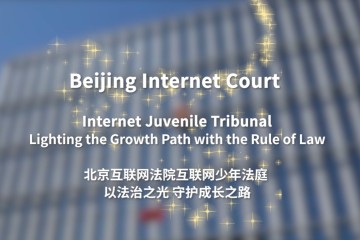BIC grows into highland of internet judiciary talents
The Beijing Internet Court (BIC) has been promoting the in-depth integration of internet technology with its trial work, fostered new drivers for higher level digital justice and the capital city's high-quality growth, and has built a team of legal professionals specializing in internet-related cases.
BIC President Zhang Wen made the remarks in a recent interview with Legal Daily, after the court was singled out as a talent highland for internet judiciary among courts in Beijing.
Since its establishment four years ago, the BIC has rolled out a series of innovative measures to improve the quality and efficiency of its judicial services, such as block chain-based intelligent contracting, and embedded QR codes for paying case-related money in the execution notice.
According to Xiong Zhigang, a judge from the Enforcement Department of the BIC, innovations in enforcement work rely on judges with pioneering spirit and concrete actions.
"The BIC is a good platform for young people. It has few ranks and a flat organizational structure. Judges can function in both scientific and technological innovation and platform construction," Xiong explained.
Unlike in traditional courts, the BIC's judges can play the role of a product manager and participate in the development of technological products, which will help facilitate case handling, he added.
With blockchain-based intelligent contracting technology, filing and execution can be accomplished with a few clicks. The Tianping blockchain docked with a copyright chain, the "E-copyright" litigation-source co-governance model developed by the BIC was awarded by the Supreme People's Court in 2022.
As the court with fewest enforcement personnel among its peers in Beijing, the BIC reported the highest execution rate, ranking first in the capital city for two consecutive years. Its average delivery period of case-related money is 2.81 days, and it is constantly breaking the record of the shortest delivery period among courts in Beijing.
By summarizing their trial practice experience, the court's judges have developed seven judgment rules, involving personal information security, intellectual property protection, competition orders of internet businesses, online platform's responsibilities, a crackdown on illegal cyberspace industries, protection boundaries for the application of emerging technologies, and the cultivation of emerging business models.
Hao Li, deputy director of the courts political department, said the BIC has encouraged judges to further improve their theoretical study through various resources on online and offline platforms.
The BIC has received more than 18,000 visitors, including 1,676 people from 48 countries and regions since its establishment. It has held online exchange activities with institutions and courts of foreign countries, promoting Chinese ideas and propositions in the rule of law in cyberspace.

 Judicial White Paper
Judicial White Paper
 Play
Play Play
Play Online Lawsuit Guide
Online Lawsuit Guide Beijing Internet Court Lawsuit Service WeChat Account
Beijing Internet Court Lawsuit Service WeChat Account  Beijing Internet Court WeChat Account
Beijing Internet Court WeChat Account